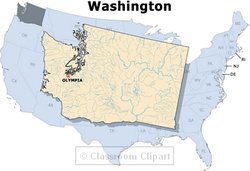Olympia, Washington
|
|
Oly20041212.jpg
Olympia is the capital of Washington, a state of the United States of America. As of the 2000 census, it has a population of 42,514. It is the county seat of Thurston County. Along with the cities of Lacey and Tumwater, Olympia is the focal point of the South Puget Sound region.
| Contents |
History
Template:US City infobox The site of Olympia was home to Lushootseed-speaking peoples for thousands of years. The abundant shellfish in the tideflats and the many salmon-spawning streams entering Puget Sound at this point made it a productive food-gathering area. Many tribes shared access to these resources, including Squaxin, Nisqually, Puyallup, Chehalis, Suquamish, and Duwamish.
In the 1830s the Hudson's Bay Company established a trading post at nearby Sequalitchew Creek (now Dupont) In the 1840s Catholic missionaries built a mission at Priest Point near the future townsite for the conversion of natives to Catholicism.
American settlers came to the area in the 1840s, drawn by the water-power potential of Tumwater Falls and established nearby "New Market," now known as Tumwater, the first American settlement north of the Columbia River.
Edmund Sylvester and Levi Smith jointly claimed the land that now comprises downtown Olympia. Smith's untimely death in 1848 left Sylvester the sole owner of the future townsite.
A campaign by settlers to create a separate territory from Oregon resulted in Congress creating the Washington Territory. Isaac I. Stevens served as its first governor. Upon his arrival in Olympia in 1853 Stevens declared it capital of the territory.
Olympia was incorporated on January 28, 1859. Olympia was made Washington's capital in 1889. Construction of the current Washington State Capitol began in 1912, with the prominent Legislative Building completed in 1928.
In 1971, The Evergreen State College was founded mostly due to the efforts of Progressive Republican Governor Daniel J. Evans.
Because of the college's presence, Olympia has become a hub for artists and musicians (many of whom have been influential in post-punk, anti-punk, anti-folk, Lo-fi, and other music trends (see Olympia music scene)). Evergreen's influence on Olympia is clear - Olympia was recently named one of the best college towns in the nation. Not surprisingly, Olympia boasts a vibrant downtown bar district.
Olympia hosts the state's largest annual Earth Day celebration, Procession of the Species, a community arts-based festival and parade.
Geography
Olympia is located at 47°2'33" North, 122°53'35" West (47.042418, -122.893077)Template:GR.
According to the United States Census Bureau, the city has a total area of 48.0 km² (18.5 mi²). 43.3 km² (16.7 mi²) of it is land and 4.7 km² (1.8 mi²) of it is water. The total area is 9.77% water.
Demographics
As of the censusTemplate:GR of 2000, there are 42,514 people, 18,670 households, and 9,969 families residing in the city. The population density is 982.3/km² (2,544.4/mi²). There are 19,738 housing units at an average density of 456.1/km² (1,181.3/mi²). The ethnic makeup of the city is 85.26% White, 1.89% African American, 1.30% Native American, 5.82% Asian, 0.29% Pacific Islander, 1.68% from other cultural backgrounds, and 3.76% from two or more ethnicities. 4.38% of the population are Hispanic or Latino of any ethnicities.
There are 18,670 households out of which 26.8% have children under the age of 18 living with them, 39.6% are married couples living together, 10.4% have a female householder with no husband present, and 46.6% are non-families. 35.2% of all households are made up of individuals and 10.7% have someone living alone who is 65 years of age or older. The average household size is 2.21 and the average family size is 2.88.
In the city the population is spread out with 21.5% under the age of 18, 11.9% from 18 to 24, 30.4% from 25 to 44, 22.9% from 45 to 64, and 13.3% who are 65 years of age or older. The median age is 36 years. For every 100 females there are 91.5 males. For every 100 females age 18 and over, there are 88.1 males.
The median income for a household in the city is $40,846, and the median income for a family is $54,136. Males have a median income of $41,267 versus $31,515 for females. The per capita income for the city is $22,590. 12.1% of the population and 6.9% of families are below the poverty line. Out of the total population, 10.4% of those under the age of 18 and 6.3% of those 65 and older are living below the poverty line.
See also
- Music of Washington, especially riot grrl
External links
- City of Olympia (http://www.ci.olympia.wa.us/)
- State of Washington (http://access.wa.gov)
- Olympia Thurston County Visitor & Convention Bureau (http://www.visitolympia.com/index2.html)
- State Capitol Visitor Information (http://www.ga.wa.gov/visitor/visitor.htm)
- Washington State Capitol Museum (http://www.wshs.org/wscm/)
- The Olympia Historical Society (http://www.olympiahistory.org/)
- The Evergreen State College (http://www.evergreen.edu/)
- South Puget Sound Community College (http://www.spscc.ctc.edu/)
- Thurston GeoData Center (http://www.geodata.org/)
- Olympia-Thurston Chamber of Commerce (http://www.thurstonchamber.com/)
- Economic Development Council of Thurston County (http://www.thurstonedc.com/)
- Washington Center for the Peforming Arts (http://www.washingtoncenter.org/)
- Olympia Farmers Market (http://www.farmers-market.org/)
- Lakefair (http://www.lakefair.org/)
- Procession of the Species (http://www.procession.org/)
- Intercity Transit (http://www.intercitytransit.com/page.cfm)

